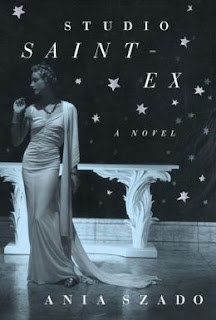 Szado's latest novel is Studio Saint-Ex.
Szado's latest novel is Studio Saint-Ex.From her Q & A with Padma Viswanathan at The Rumpus:
Rumpus: Studio Saint-Ex had its origins, in part, in your longtime love—a love that millions share—for Saint-Exupéry’s final book, The Little Prince, and I found multiple references in your novel to that book, however transformed: in the narrator thinking the little prince more fragile than he had realized, which is how Mignonne thinks of Consuelo; in the image of the narrator carrying a little boy with tousled blond hair; and, more generally, in the rose’s difficult nature and the little prince’s dedication to her despite her vanity, both of which are mirrored in the relationship between Saint-Exupéry and his wife. Did you come to read The Little Prince, or other Saint-Exupéry novels, differently than you had before, because of writing this book?Learn more about the book and author at Ania Szado's website.
Szado: Absolutely. But I must say, I didn’t entirely grasp how my reading of Saint-Exupéry’s novels had changed until I contemplated how Mignonne’s take on his material might evolve as her vision for their relationship changed. I didn’t realize, until I saw how she held tight to a reading of his heroes as doomed, determined, honorable men—reflecting her sense of Saint-Ex himself—that I too had initially slotted them into this conveniently romantic category.
It was a relief to be shaken out of this too-easy take on his creations. Through repeated readings of Saint-Exupéry’s letters, and the works of his biographers (particularly Stacy Schiff), I came to see how Saint-Exupéry’s inquisitive and disillusioned sides were expressed through the prince and other characters, and how Saint-Ex’s works reflected both his despair at life’s banal realities and what he saw as an inevitable trajectory toward a future lacking in humanity and free will, as well as his veneration of the uncorrupted childlike mind and the spiritual or eternal. Once I saw the connection between his mindset and his work, I could begin to seed ideas throughout my novel to suggest to the reader how The Little Prince came to be the haunting work that it is. It is, I think, like a cabinet with secret drawers. The cabinet is lovely and masterfully crafted, but one must live through episodes of confusion and pain, and grow in maturity, before the hidden drawers reveal themselves and their contents. Which is not to say they offer answers. The beauty of The Little Prince is, I think, how...[read on]
The Page 69 Test: Studio Saint-Ex.
Writers Read: Ania Szado.
--Marshal Zeringue